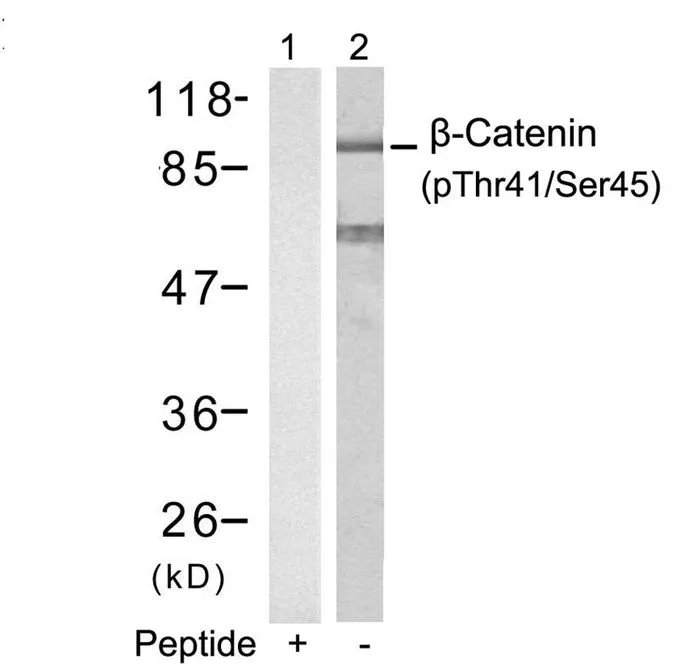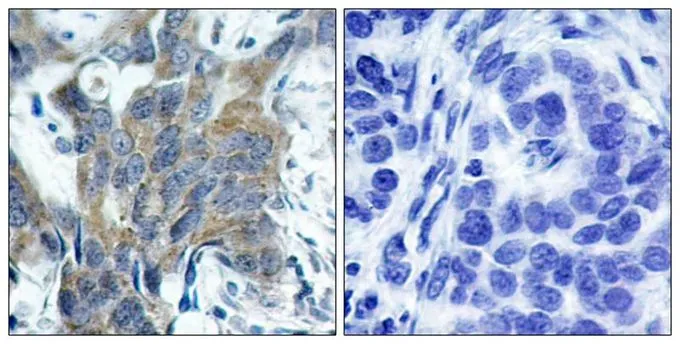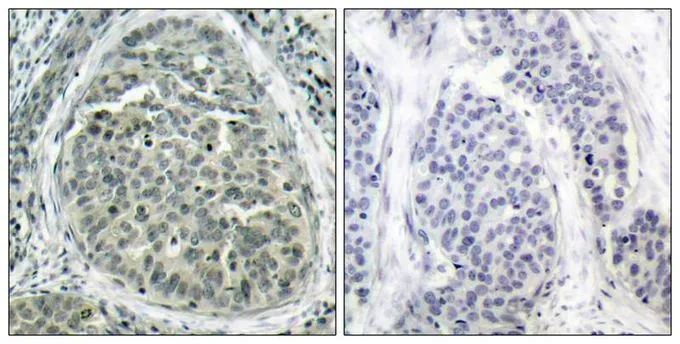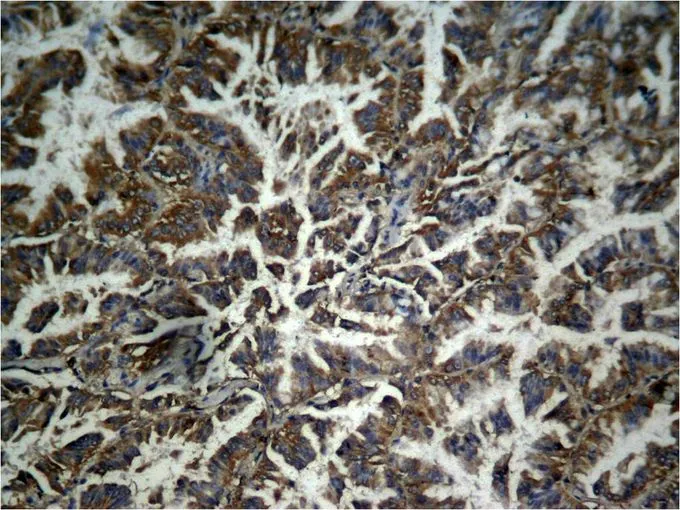![FACS analysis of A549 cells using GTX83185 beta Catenin antibody [4D5]. Green : beta Catenin Purple : negative control FACS analysis of A549 cells using GTX83185 beta Catenin antibody [4D5]. Green : beta Catenin Purple : negative control](https://www.genetex.com/upload/website/prouct_img/normal/GTX83185/GTX83185_20170912_FACS_w_23061322_232.webp)
FACS analysis of A549 cells using GTX83185 beta Catenin antibody [4D5]. Green : beta Catenin Purple : negative control
beta Catenin antibody [4D5]
GTX83185
ApplicationsFlow Cytometry, ImmunoFluorescence, Western Blot, ELISA, ImmunoCytoChemistry, ImmunoHistoChemistry, ImmunoHistoChemistry Paraffin
Product group Antibodies
ReactivityHuman
TargetCTNNB1
Overview
- SupplierGeneTex
- Product Namebeta Catenin antibody [4D5]
- Delivery Days Customer9
- Application Supplier NoteWB: 1/500 - 1/2000. ICC/IF: 1/200 - 1/1000. IHC-P: 1/200 - 1/1000. FACS: 1/200 - 1/400. ELISA: 1/10000. *Optimal dilutions/concentrations should be determined by the researcher.Not tested in other applications.
- ApplicationsFlow Cytometry, ImmunoFluorescence, Western Blot, ELISA, ImmunoCytoChemistry, ImmunoHistoChemistry, ImmunoHistoChemistry Paraffin
- CertificationResearch Use Only
- ClonalityMonoclonal
- Clone ID4D5
- ConjugateUnconjugated
- Gene ID1499
- Target nameCTNNB1
- Target descriptioncatenin beta 1
- Target synonymsCTNNB, EVR7, MRD19, NEDSDV, armadillo, catenin beta-1, catenin (cadherin-associated protein), beta 1, 88kDa
- HostMouse
- IsotypeIgG1
- Protein IDP35222
- Protein NameCatenin beta-1
- Scientific DescriptionThe protein encoded by this gene is part of a complex of proteins that constitute adherens junctions (AJs). AJs are necessary for the creation and maintenance of epithelial cell layers by regulating cell growth and adhesion between cells. The encoded protein also anchors the actin cytoskeleton and may be responsible for transmitting the contact inhibition signal that causes cells to stop dividing once the epithelial sheet is complete. Finally, this protein binds to the product of the APC gene, which is mutated in adenomatous polyposis of the colon. Mutations in this gene are a cause of colorectal cancer (CRC), pilomatrixoma (PTR), medulloblastoma (MDB), and ovarian cancer. Three transcript variants encoding the same protein have been found for this gene.[provided by RefSeq, Oct 2009]
- ReactivityHuman
- Storage Instruction-20°C or -80°C,2°C to 8°C
- UNSPSC12352203

![ICC/IF analysis of A549 (left) and SK-BR-3 (right) cells using GTX83185 beta Catenin antibody [4D5]. Green : beta Catenin Blue: DRAQ5 fluorescent DNA dye Red: Actin filaments ICC/IF analysis of A549 (left) and SK-BR-3 (right) cells using GTX83185 beta Catenin antibody [4D5]. Green : beta Catenin Blue: DRAQ5 fluorescent DNA dye Red: Actin filaments](https://www.genetex.com/upload/website/prouct_img/normal/GTX83185/GTX83185_20170912_ICCIF_w_23061322_557.webp)
![IHC-P analysis of human Placenta tissue using GTX83185 beta Catenin antibody [4D5]. IHC-P analysis of human Placenta tissue using GTX83185 beta Catenin antibody [4D5].](https://www.genetex.com/upload/website/prouct_img/normal/GTX83185/GTX83185_20170912_IHC-P_w_23061322_144.webp)
![WB analysis of beta Catenin -hIgGFc transfected HEK293 cell lysate using GTX83185 beta Catenin antibody [4D5]. WB analysis of beta Catenin -hIgGFc transfected HEK293 cell lysate using GTX83185 beta Catenin antibody [4D5].](https://www.genetex.com/upload/website/prouct_img/normal/GTX83185/GTX83185_20170912_WB_w_23061322_163.webp)






![ICC/IF analysis of HT29 cells using GTX80159 beta Catenin antibody [EM-22]. Green : Primary antibody Blue : DAPI](https://www.genetex.com/upload/website/prouct_img/normal/GTX80159/GTX80159_20191028_ICC-IF_1_w_23061322_986.webp)
![WB analysis of whole cell extracts (30 microg lysate) of HeLa (Lane 1), U-87 MG (Lane 2), COLO 205 (Lane 3), HCT 116 (lane 4), HT-29 (lane 5), MCF7 (lane 6), MDA-MB-231 (lane 7) and A549 (lane 8) using GTX80686 beta Catenin antibody [9F2]. Dilution : 1-3 microg/ml](https://www.genetex.com/upload/website/prouct_img/normal/GTX80686/GTX80686_1951_WB_w_23061322_182.webp)
![IHC-P analysis of human lung tissue using GTX84650 beta Catenin antibody [1F3]. Antigen retrieval : Heat-induced epitope retrieval by 10mM citrate buffer, pH6.0, 100oC for 10min.](https://www.genetex.com/upload/website/prouct_img/normal/GTX84650/GTX84650_2979_IHC-P_w_23061420_370.webp)